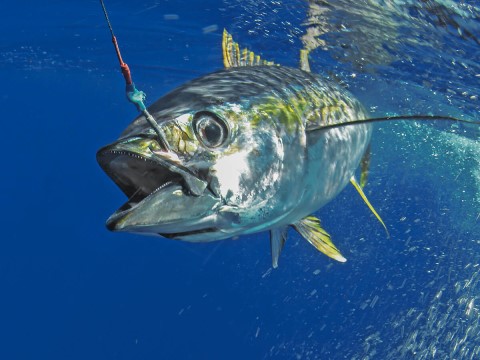How to Catch Yellowfin Tuna Trolling
Yellowfin Tuna, also known as Thunnus albacares, is a species of tuna that is deep blue on top, has a shallow yellow line all the way to the tail in the middle and their fins are yellowish color. Yellowfin is one of the larger tuna species with the potential of reaching up to a weight of 180 kg. They are mainly found in the offshore waters such as Gulf of Meixco, Hawaii, Caribbean, Eastern and Western Pacific.
Trolling for Yellowfin Tuna
Yellowfin Tuna usually travel in large schools to the surface during feeding time. They are boat shy and will quickly dive deep into the water when they see a boat approaching. Therefore, upon spotting the school of tuna from afar, you must not steer your boat fast toward them otherwise they will swim away. The strategy to catching tuna is to stop your boat a distance away from the fish for example, 3 knots away. Then, you can put out your fishing line and let the bait float itself to where the school of tuna is.
When you stop your boat, the engine stops producing noises and the fish will be more bold to swim near your boat. Parking your boat a distance away prevents the tuna from associating the bait comes from your boat. Hiring a big fishing charter will give you a better fishing experience. When you reel in the fish, the fish will jump and flip and you will have fight the fish until it is dead. If your fishing charter is small and there is not enough room, you may accidentally step on your expensive fishing rig or even fall out of the boat.
Learn more about the Yellowfin Tuna Species
Ideally, your fishing charter should be large enough to set up 6 – 7 flush mount or vertical fishing rods. The more fishing rods you set up, the higher the chance of catching the tuna. After you stop the boat afar, you just wait patiently. You may have to wait up to 7- 8 hours for the first bite but it is worth the wait. While waiting, you must stay alert and quickly pull in the rod when you sense something bites. It is important to always wear thick buckskin glove when pulling in the rod. It will protect the skin on your palm and finger from callouses as you need a lot of strength to pull in the rod.
Cedar Plugs Tuna Fishing Lures
It is best to go fishing for yellowfin tuna with 1 or 2 partners as they can give you additional hands in catching the fish. For example, your partner can help with storing the rod in a cabin space or help you in getting the fish into the boat. Lures like tuna feathers, cedar plugs, chain, joeschutes and sterling bars can be used. For catching yellowfin tuna, the boat should be trolling at the speed of 5 – 8 knots. You can adjust your boat speed according to the behavior of the lure. Rougher seas mean you have to troll at a slower speed to enable the lure to work the most efficiently.
Trolling Speed for Yellowfin Tuna
Speed is a big deal when you are trolling for yellowfin. You want to keep the boat moving just fast enough to get the lures looking natural in the water. For yellowfin, I usually stick to around 6 to 8 knots. Some days, they will bite faster, other days slower, so its always worth experimenting. Watch how the lures move, they should be skipping along the surface, not dragging or spinning.
If your not getting any bites, try adjusting the speed up or down by half a knot. Sometimes that little tweak makes all the difference. Also keep in mind the sea conditions. If its rough, you might have to slow down a bit to keep everything running smoothly. But on a calm day, you can push it a little quicker.
Trolling for Tuna Spread
Now, lets talk about your spread. You are not just chucking a bunch of lures out and hoping for the best. You have got to think about placement. I usually run a mix of lures at different distances and depths to cover more water. The goal is to mimic a school of baitfish scattered across the surface.
Start with a few lures in the long positions.. one straight off the back, and maybe another further out to the side. Then, you will want a couple of shorter lines closer to the boat. I like to run one lure in the prop wash, right behind the boat. It is a prime spot for yellowfin because they are sometimes attracted to the bubbles and commotion.
Also, don’t forget about outriggers. They are a great way to spread out your lures and cover more ground. The more ground you cover, the better your chances of hooking a yellowfin.
Keep an eye on the water while you’re trolling too. If you see birds diving or baitfish jumping, get your spread in the zone quick smart! that’s where the tuna will be hanging out.
Check out our Tuna Spreader Bar Pages
Stay tuned for more tips and tricks on How To Catch Tuna.

 Penn Tuna Fishing Rod & Reel Combo
Penn Tuna Fishing Rod & Reel Combo Cedar Plugs Tuna Fishing Lures
Cedar Plugs Tuna Fishing Lures View Best Tuna Fishing Lures
View Best Tuna Fishing Lures Stainless Steel Fishing Leaders
Stainless Steel Fishing Leaders Fishing Rod Holder
Fishing Rod Holder Lures Bait Rig Or Hooks
Lures Bait Rig Or Hooks